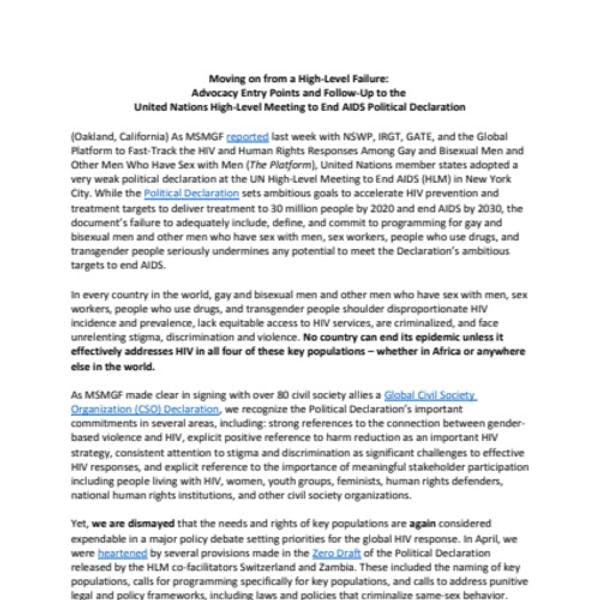Moving on from a High‐Level Failure: Advocacy Entry Points and Follow‐Up to the United Nations High‐Level Meeting to End AIDS Political Declaration
By Global Forum on MSM & HIV
Oakland, California
As MSMGF reported last week with NSWP, IRGT, GATE, and the Global Platform to Fast‐Track the HIV and Human Rights Responses Among Gay and Bisexual Men and Other Men Who Have Sex with Men (The Platform), United Nations member states adopted a very weak political declaration at the UN High‐Level Meeting to End AIDS (HLM) in New York City. While the Political Declaration sets ambitious goals to accelerate HIV prevention and treatment targets to deliver treatment to 30 million people by 2020 and end AIDS by 2030, the document’s failure to adequately include, define, and commit to programming for gay and bisexual men and other men who have sex with men, sex workers, people who use drugs, and transgender people seriously undermines any potential to meet the Declaration’s ambitious targets to end AIDS.
In every country in the world, gay and bisexual men and other men who have sex with men, sex workers, people who use drugs, and transgender people shoulder disproportionate HIV incidence and prevalence, lack equitable access to HIV services, are criminalized, and face unrelenting stigma, discrimination and violence. No country can end its epidemic unless it effectively addresses HIV in all four of these key populations – whether in Africa or anywhere else in the world.
As MSMGF made clear in signing with over 80 civil society allies a Global Civil Society Organization (CSO) Declaration, we recognize the Political Declaration’s important commitments in several areas, including: strong references to the connection between gender‐ based violence and HIV, explicit positive reference to harm reduction as an important HIV strategy, consistent attention to stigma and discrimination as significant challenges to effective HIV responses, and explicit reference to the importance of meaningful stakeholder participation including people living with HIV, women, youth groups, feminists, human rights defenders, national human rights institutions, and other civil society organizations.
Yet, we are dismayed that the needs and rights of key populations are again considered expendable in a major policy debate setting priorities for the global HIV response. In April, we were heartened by several provisions made in the Zero Draft of the Political Declaration released by the HLM co‐facilitators Switzerland and Zambia. These included the naming of key populations, calls for programming specifically for key populations, and calls to address punitive legal and policy frameworks, including laws and policies that criminalize same‐sex behavior.
Keep up-to-date with drug policy developments by subscribing to the IDPC Monthly Alert.
